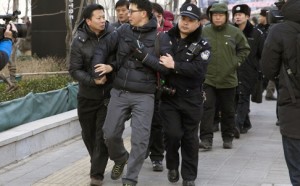Re-education through labourL is a thing of the past, but criminal detention now takes its place
PUBLISHED : Monday, 21 April, 2014, 3:21am UPDATED : Monday, 21 April, 2014, 5:48pm
Verna Yu
[email protected]
 Police increasingly use short stints in detention to silence those who may previously have been sent to re-education-through-labour camps. Photo: AP
Police increasingly use short stints in detention to silence those who may previously have been sent to re-education-through-labour camps. Photo: AP
Keen to learn about the United Nations’ review of human rights in China, Cao Shunli planned to travel to Geneva last September. She never made her flight. Beijing police barred her from boarding her plane on September 14. Then the human rights activist disappeared.
Her family had no idea where she was until nearly a month later, when they received word from the police saying that Cao was accused of illegal assembly and had been placed in criminal detention. Police charged her on October 21 with “picking quarrels and provoking trouble”.
Her troubles stemmed from her participation in a two-month sit-in outside the foreign ministry to press the government to let petitioners contribute towards its human rights report to the UN, as well as her decision to submit her own report to the UN. Her report documented activists who spoke out against judicial problems and corruption, who often found themselves subjected to torture and arbitrary detention.
Throughout her six months in custody, authorities repeatedly denied Cao visits from family and treatment for health problems including tuberculosis and liver disease, said her lawyer, Wang Yu. On February 20 she was rushed to hospital in a coma. Authorities granted her bail a week later, but she was too ill to leave. She died at the hospital on March 14.
Cao’s plight is hardly isolated.
After the authorities last year stopped the notorious practice of sending people to re-education-through-labour camps, legal experts and rights lawyers noticed a rise in the number of activists placed in criminal detention.
In recent months, rights groups have chronicled dozens of cases in which police have detained activists on public disorder charges such as illegal assembly, “picking quarrels and provoking trouble” and “gathering a crowd to disturb public order”. Lawyers say the accusations are often vague and target conduct that is not actually criminal.
Statistics are impossible to obtain, due to the lack of transparency in the legal system and the difficulty in differentiating between politically motivated and non-political public order charges. But activists and petitioners also say they are experiencing more criminal detentions than before since the abolition of re-education through labour.
For detail please visit here
